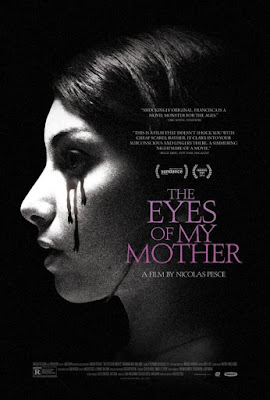An oddball endeavor if ever there was one, A DARK PLACE (originally titled Steel Country) takes place in small-town Pennsylvania but was filmed in Georgia with a British director (Simon Fellows, shown just below) at the helm and its leading actors all from Ireland.
Whatever: The movie works, and in fact does a lot more than that. It gives the fine actor Andrew Scott (shown on poster, right, and further below) the best role I've yet seen him play, as it very unusually and interestingly places a character somewhere on the spectrum of Aspergers syndrome in the center of this tale involving a child's disappearance, a cover-up, and a desperate attempt to do the right thing.
Small-town America in the time of Trump (the first thing we see in the film is a Trump placard on a shabby front lawn), with its own special structure serving the wealthy and powerful, is front and center here, with everything working just fine, so long as people know their place -- and stay in it.
Mr. Fellows does a good job of bringing Brendan Higgins' first-class screenplay to life. His pacing is steady and increasingly fraught, as our difficult hero, Donald, a sanitation worker (played by Mr. Scott), attempts to learn what really happened to the young boy who used to wave to to him daily on his sanitation route and is now said to have accidentally drowned.
As the information Donald gleans points ever more clearly toward a cover-up, the powers-that-be -- from police to community "leaders" -- close ranks. What some critics have pointed to as preposterous and/or risible plot turns strike TrustMovies as more like business-as-usual in small town America.
And so, anything goes, and by the finale our hero is lucky to have been left in one piece. What he feels he must do is thus horrible yet perfectly understandable, under these Trump-land circumstances and those of his own constantly anxious state.
Mr. Scott's rich, lovely and angry performance as the quirky, unstable Donald carries the movie. He is as difficult as he is worth caring for and about. And the two most important women in his life -- his "ex" (played sadly and smartly by Denise Gough, below),
and his co-worker, Donna, who also carries a torch for the guy (a wonderful job by Bronagh Waugh, below) -- make Donald's exasperating-but-worth-it combination painfully obvious.
Two scenes stand out among many that nail our hero's singular and difficult world: his sudden verbal use of his and Donna's names as a reason for them not to connect, and another, purely visual moment, as Donald quietly sits in the middle of a closed circle of drawing pencils, all arranged by color. In a world more just, in which Academy members dare venture beyond what the box-office and/or typical media pundits offer up, Mr. Scott's performance might draw Oscar consideration.
This quiet, sad little film is so much better than many other big-budget dramatic wanna-bes featuring "name" actors and/or directors that you ought not let it get by without a watch. From Shout! Studios and running just 89 minutes, A Dark Place arrived on Blu-ray, DVD and digital download last week -- for purchase and/or rental.




































